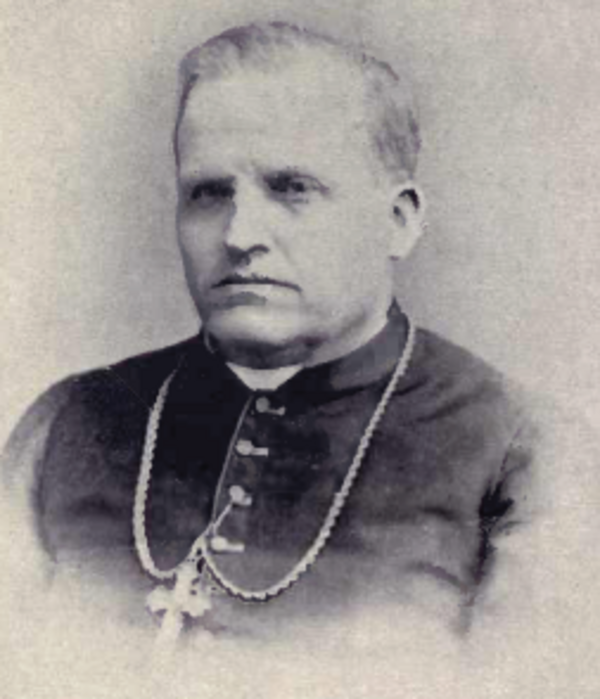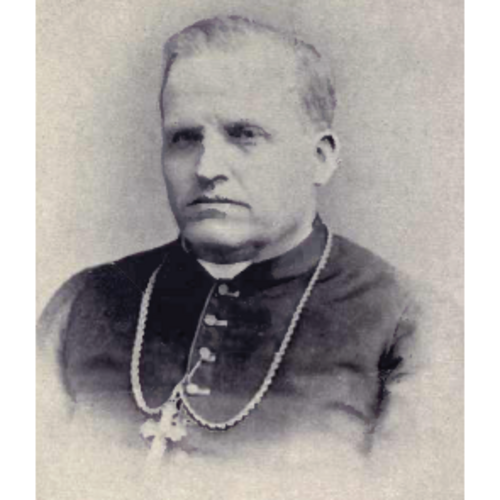
Source: Courtesy of Wikimedia Commons
McDONALD, JAMES CHARLES, Roman Catholic priest and bishop; b. 15 July 1840 in Allisary, P.E.I., son of John Macdonald and Ellen Macdonald; d. 1 Dec. 1912 in Charlottetown.
Charles McDonald was born into the same Island Scottish community that had fostered the first three bishops of Charlottetown. Educated locally, he went on to Central Academy in Charlottetown, where he trained as a teacher. In 1866 he entered St Dunstan’s College to prepare for the priesthood. Three years later he went on to the Séminaire de Saint-Sulpice in Montreal for his theological training. He was ordained by Bishop Peter McIntyre* on 4 July 1873 in Charlottetown.
Father Charles spent the next two years as a professor at St Dunstan’s; then, in 1875, he was appointed pastor to Georgetown and Cardigan, settling at Georgetown. From 1876 to 1878 he added nearby St Cuthbert’s at Glencoe (St Teresa) to his charge, and from 1881 to 1884 he was also responsible for St Paul’s, Sturgeon. His success as a parish priest – he was said to have “reclaimed many lost sheep” – led to his appointment in July 1884 as rector of St Dunstan’s, then on the verge of closure. Over the next five years he orchestrated a remarkable turnaround in the college’s fortunes, rebuilding its enrolment and restoring financial stability.
When deteriorating health caused Bishop McIntyre to petition Rome for a coadjutor with right of succession in 1889, his chosen candidate was McDonald. “He is not, it is true, noted for any show of learning or dash,” McIntyre wrote to Cornelius O’Brien*, the archbishop of Halifax, “but his judgment nevertheless is good, and his many other good qualities of head and heart highly recommend him.” Despite opposition from Island Irish critics of the Highland Scottish hegemony within the diocese, McDonald was consecrated on 28 Aug. 1890. At McIntyre’s death on 30 April 1891, he became fourth bishop of Charlottetown.
McDonald inherited a diocese that had now reached maturity, and in many ways his regime consolidated the work begun by his predecessor. The scattered missions of the earlier settlement period became a patchwork of small parishes, each with its resident pastor. New and elaborate churches were erected, chief among them St Dunstan’s Cathedral in Charlottetown, constructed between 1896 and 1907. At the same time a surfeit of religious vocations turned the diocese into an exporter of priests and religious. McDonald’s administrative difficulties stemmed largely from the struggle to control fractious priests such as Alfred Edward Burke*, the talented but erratic pastor at Alberton.
After the bitter controversy of the 1860s and 1870s between the Island’s Catholics and Protestants, sectarian conflict had gone underground. To a certain extent, parallel societies had emerged. By tacit agreement, de facto separate schools continued within the non-denominational public school system, and corresponding Roman Catholic and Protestant (or Protestant-dominated) institutions persisted in many places. Where sectarian interests overlapped, as in the disbursement of government patronage, McDonald worked to ensure that Catholics received their proper share. Perhaps the most spectacular example of such lobbying came in 1898, when he pledged to support the provincial Liberals in the next election if the Liberal cabinet of Premier Donald Farquharson* would endorse Dr Peter Adolphus McIntyre, a Catholic Liberal, for the vacant lieutenant governorship.
McDonald appears to have played only a minor part in Roman Catholic ecclesiastical politics, although he opposed the creation of an Acadian diocese in New Brunswick [see Sir Pierre-Amand Landry], deeming it likely to cause “race hatred.” His final illness was blamed on “the worry” incident to his participation in 1909 in the first meeting of all Canadian prelates, the Plenary Council, at Quebec. His health deteriorated rapidly, and his increasing mental debility caused confusion and bickering about who was, or should be, in control of the diocese. At last, on 25 Nov. 1911, the Vatican appointed an apostolic administrator. The bishop lingered on, confined to his own room, until December 1912. His body was laid to rest beneath his new cathedral. Three months later, fire brought that monument to his episcopate crashing down over his crypt.
As bishop, McDonald lacked the epic stature of his Highland predecessors. He was plain-spoken and unpretentious, practical rather than poetic, solid but not brilliant. The administrative drift caused by his long illness tarnished even his achievements. His successor was an Irish New Brunswicker, Henry Joseph O’Leary*, whose appointment in 1913 effectively ended Island Scots’ dominance of the diocese. Moreover, McDonald remains the last native Islander to be bishop of Charlottetown.
Bishop McDonald’s papers and private letters are preserved in the Arch. of the Diocese of Charlottetown.
Arch. of the Diocese of Charlottetown, Peter McIntyre papers; James Morrison papers. NA, RG 31, C1, 1881, 1891, Prince Edward Island. PARO, Acc. 3271, RBMB for All Saints’ Roman Catholic Church (Cardigan) and St James Roman Catholic Church (Georgetown) (mfm.); P.E.I. Geneal. Soc. coll., esp. master name index; Supreme Court, estates div. records, liber 19: f.155 (mfm.). Univ. of P.E.I. Library (Charlottetown), P.E.I. Coll., R. B. Macdonald, “MacDonalds in P.E.I.” (typescript, c. 1892–94). Charlottetown Guardian, 2–3 Dec. 1912. Examiner (Charlottetown), 2 Dec. 1912. Herald (Charlottetown), 3 Sept. 1890, 4 Dec. 1912. Patriot (Charlottetown), 28 Aug. 1890; 2, 5 Dec. 1912. Watchman (Charlottetown), 28 Aug. 1890, 6 Dec. 1912. E. M. Cullen, “Growth and expansion (1891–1929),” in The Catholic Church in Prince Edward Island, 1720–1979, ed. M. F. Hennessey (Charlottetown, 1979), 103–18. Cyclopædia of Canadian biog. (Rose and Charlesworth), vol.2. G. E. MacDonald, The history of St. Dunstan’s University, 1855–1956 (Charlottetown, 1989). W. E. MacKinnon, The life of the party: a history of the Liberal party in Prince Edward Island ([Charlottetown], 1973). J. C. Macmillan, The history of the Catholic Church in Prince Edward Island from 1835 till 1891 (Quebec, 1913). Past and present of Prince Edward Island . . . , ed. D. A. MacKinnon and A. B. Warburton (Charlottetown, [1906]), 552–53. Joseph Pope, Public servant: the memoirs of Sir Joseph Pope, ed. Maurice Pope (Toronto, 1960).
Cite This Article
G. Edward MacDonald, “McDONALD, JAMES CHARLES,” in Dictionary of Canadian Biography, vol. 14, University of Toronto/Université Laval, 2003–, accessed March 31, 2025, https://www.biographi.ca/en/bio/mcdonald_james_charles_14E.html.
The citation above shows the format for footnotes and endnotes according to the Chicago manual of style (16th edition). Information to be used in other citation formats:
| Permalink: | https://www.biographi.ca/en/bio/mcdonald_james_charles_14E.html |
| Author of Article: | G. Edward MacDonald |
| Title of Article: | McDONALD, JAMES CHARLES |
| Publication Name: | Dictionary of Canadian Biography, vol. 14 |
| Publisher: | University of Toronto/Université Laval |
| Year of revision: | 1998 |
| Access Date: | March 31, 2025 |



